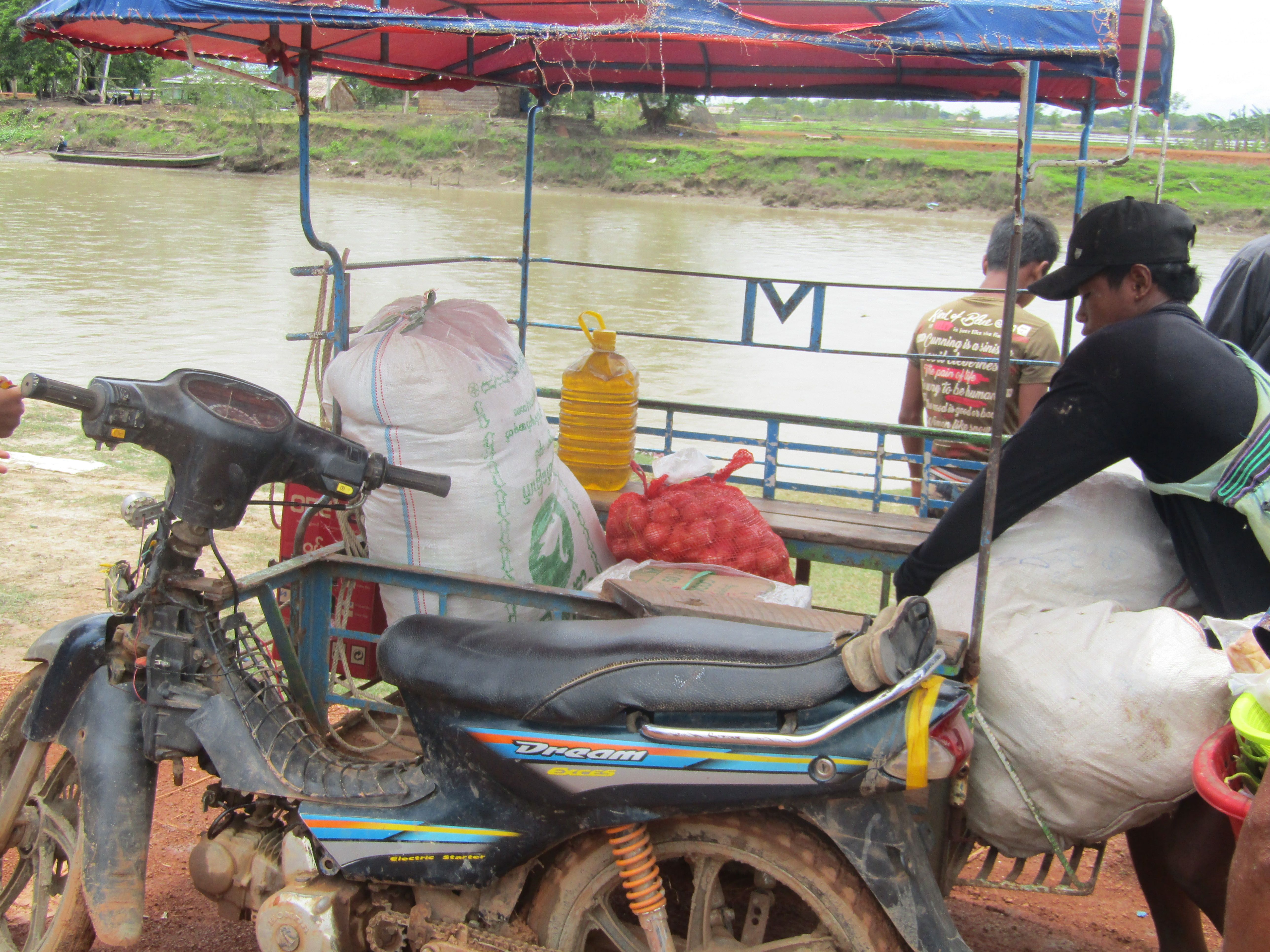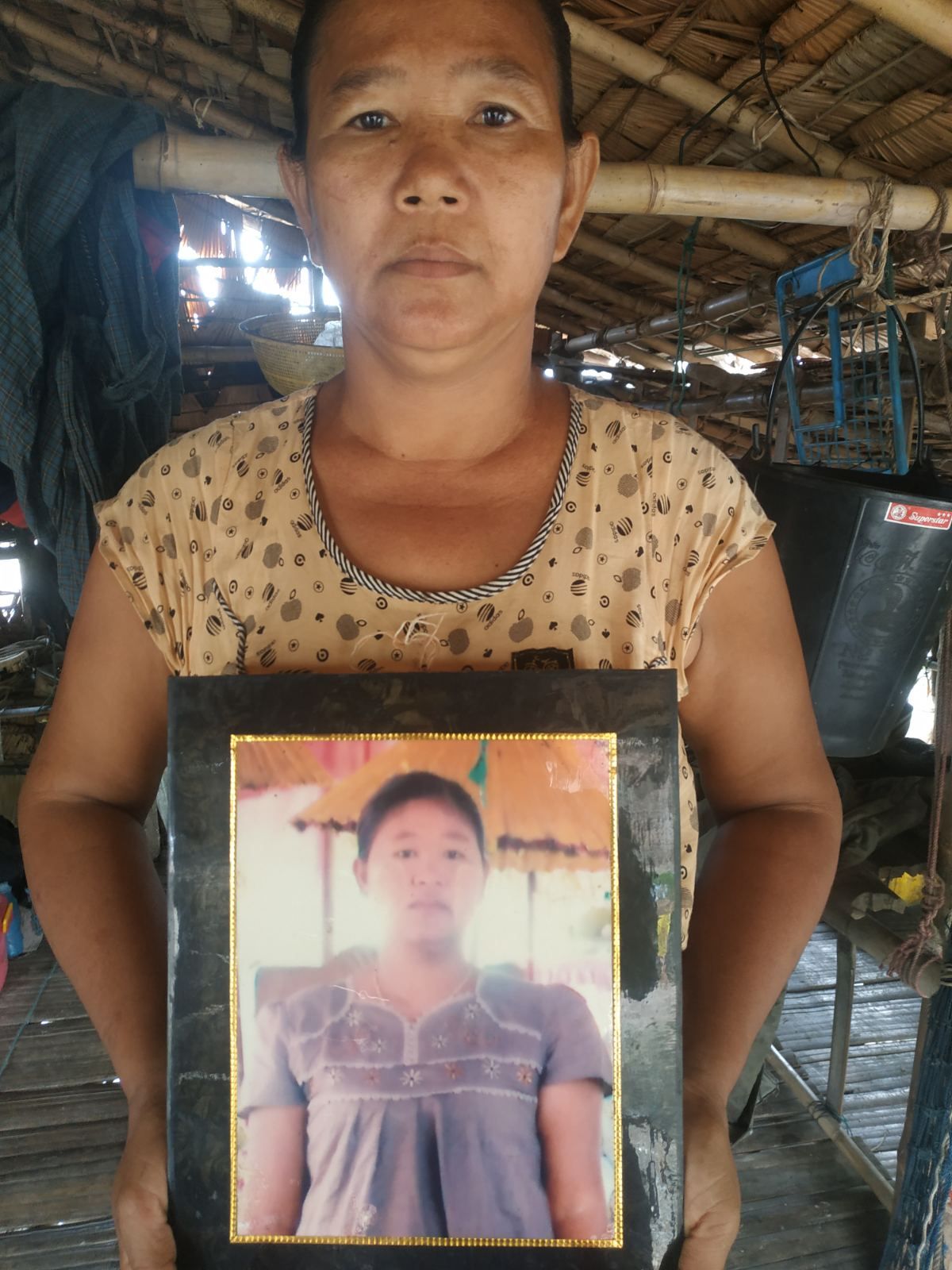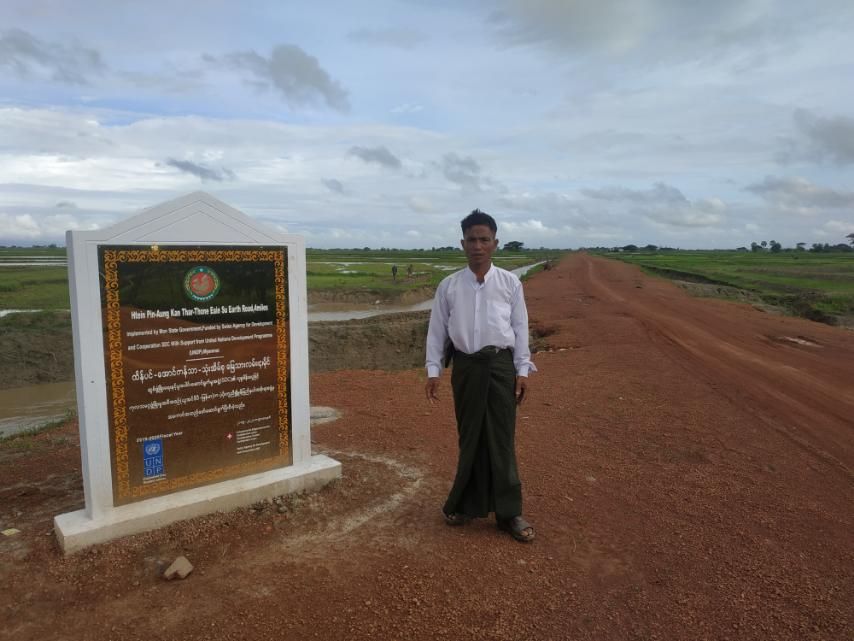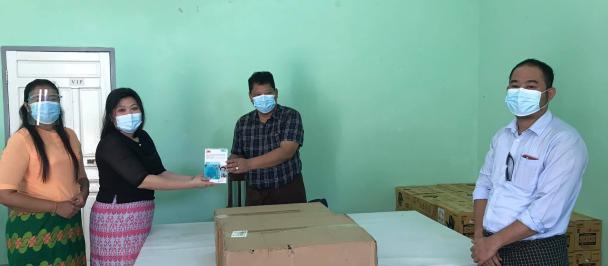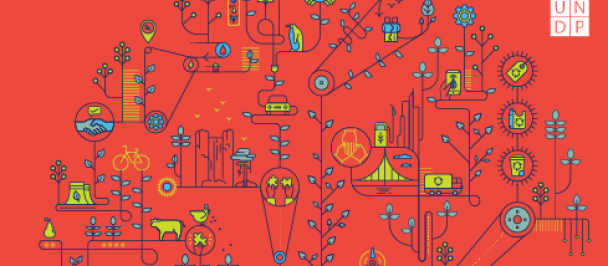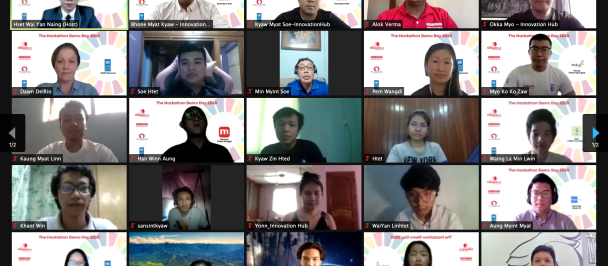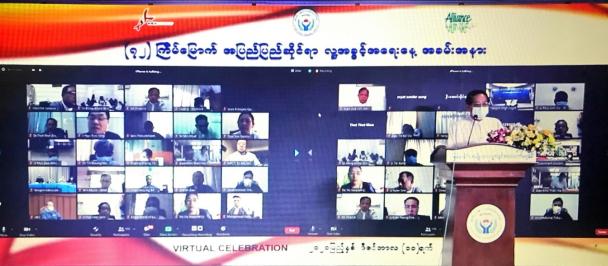A carriage is attached to motorcycle for the taxi service. Photo: UNDP Myanmar
Close to five years ago, tragedy struck Daw Myaing Myaing Than and her family. Back then they were not aware of rural planning and gave it little thought about how it would affect their lives.
Daw Myaing Myaing Than holds a picture of her late sister Daw Ohn Than. Photo: UNDP Myanmar
On a summer afternoon, her younger sister, Daw Ohn Than, suffered severe post-natal bleeding, which could only be treated in Thaton Hospital, in Thaton. Daw Myaing recalls that day: “At first, we tried to send her by boat, but there was no water in the irrigation canal. So, four men carried her in a makeshift cradle through dried up stream beds, paddy fields, and fallow lands. It was a very difficult journey and my poor sister bled along the way. It took four hours to reach the hospital and shortly after arriving, she passed away.” If Daw Ohn Than had arrived 30 minutes earlier, she could have survived.
Two years later, Daw Myaing’s son-in-law, then 25, was bitten by a snake. Again, due to the poor infrastructure, he got there too late. Daw Myaing recounted sadly: “He was carried to the creek, an hour’s walk away. From there, for two hours, a boat took them along an irrigation ditch, leading them to a small jetty near the town. With another hour-long journey to the hospital by motorbike, he did not reach the hospital in time.”
Daw Myaing’s village Aung Kan Thar lies just nine miles from Thaton. But, for decades, there was no road linking the village and the town. To travel to Thahton, villagers had to take a boat along an irrigation ditch or journey through several villages, both routes taking three to four hours. Daw Myaing says, “in those days, we went to town only when it was absolutely necessary. The lack of a good road left our village underdeveloped. We lived in a sort of secluded world, wishing we had a good road to nearby villages and Thahton. While we were quite near in distance, we were left behind.” More than 5,000 residents of Aung Kan Thar and nearby villages had the same wish.
So, in 2017, when Thaton township authorities began working with UNDP on Township Planning, U Chit Aung, the village administrator from Aung Kan Thar, was an eager participant.
U Chit Aung stands beside the 4-mile-long community road. Photo: UNDP Myanmar
During the discussions, U Chit Aung proposed a community road connecting Aung Kan Thar and two nearby villages. “My proposal aimed to address the challenges we face in accessing basic services like education and healthcare in our village. Teachers did not stay long in our village, and when we got sick we lacked proper healthcare services. Without a road, we also had no means of quickly evacuating people during natural disasters. When cyclones or floods impacted our village, the necessary goods and services needed to relieve the situation would not arrive fast enough.”
A four-mile-long community road, connecting Aung Kan Thar, Htain Pin and Thone Eain Su villages with Thahton, was made a priority for the township. The project funded by the Government of Switzerland, began construction this January and was completed in March.
“Now we can reach Thaton in two hours, day and night. The road has brought opportunities for development to our village,” says U Chit Aung. “We now plan to request authorities to use the road to extend electricity to our village.”
“Before, most children’s education ended at 8th grade, now our children can attend higher grades in other places, including in Thaton. Transportation costs have fallen, meaning village shops offer much cheaper prices for basic commodities,” he added.
The nearest community health center is now just a fifteen-minute ride by motorcycle. Accessing basic services has eased considerably and there are now increased opportunities for businesses to grow.
A carriage is attached to motorcycle for the taxi service. Photo: UNDP Myanmar
Ko Ye Htet, a native of Aung Kan Thar, used to work as a seasonal laborer. With the completion of community road, he decided to leave his laborer days behind. He added a side carriage to his motorcycle, which he now operates as a motorcycle taxi.
“Before the road was built, there would be many days where I had no work. As a result, I would often have to borrow money with very high interest rates to pay for food and services. When the road was built, I began to carry passengers and goods to local villages. As a result, my income has increased considerably. I now earn between 6,000 and 10,000 Kyat every day and I do not have to borrow money for food.” Ko Ye Htet is not alone, many likeminded entrepreneurs are using the road to develop new business opportunities. Now there are 15 trishaws, more than 20 tri-motorcycles, as well as 6 light trucks operating along the road.
Following the outbreak of COVID-19, the community road has become even more vital, with Mon State being the transit point for repatriated migrant workers from Thailand. Government assistance, including rice, cooking oil and beans, have reached villages, in time; and Aung Kan Thar and other communities can now easily access reproductive health care services for pregnant women and children under five years of age. “It’s all because of this road,” said U Chit Aung.
The Township Democratic Local Governance project aims to support 15 township administrators, 10 in Mon State and five in Bago Region, to provide efficient and effective basic services in an inclusive, accountable and transparent manner, by giving townships much more control over financial expenditures to implement infrastructure projects. Additionally, through providing technical assistance, the capacities to utilize grants effectively and inclusively within townships have been strengthened. The project has been positioned to support the effective decentralisation of decision making.
Ultimately, the project aims to ensure investment decisions in participating townships are informed by, and more accountable to, a broader and more inclusive range of stakeholders. In doing so, interventions promote and help underpin a stable and peaceful political settlement promoted through local engagement and a stronger social contract between the State and the people.

 Locations
Locations